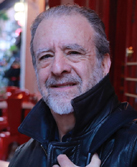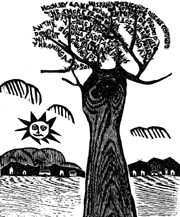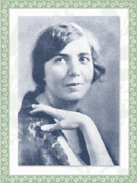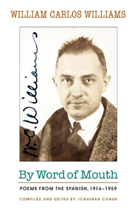  JONATHAN COHEN is a poet, translator, essayist, and scholar. He published his first collection of poetry, Poems from the Island, in 1979 with Street Press. About this documentary poetry based on Long Island history, critic Paul Dolan says: "Jonathan Cohen has re-created a sense of place, given a 'local habitation and a name' to an island too often seen as simply a wide shoulder for a highway on which people with no history hurry toward no future" (see "Paumanok"; "Ascrimshontering"; "Paradise";
"Cedar Hill" w/audio).
A current work in progress, "Open Heart Poetry," is a collection of personal lyrics (see
"Something Special";
"Rendezvous";
"Birthday Flowers";
"Footloose One").
Another work in progress, "American Journeys," is a sequence of poems intermixed with verse translations and prose, all of which explore the American experience in both historical and contemporary terms (see
"Journey through Streets";
"Poospatucks";
"Niagara Falls";
"The Tishomingo (1855)";
"Football Season in Ohio";
"Walt Whitman" w/audio). JONATHAN COHEN is a poet, translator, essayist, and scholar. He published his first collection of poetry, Poems from the Island, in 1979 with Street Press. About this documentary poetry based on Long Island history, critic Paul Dolan says: "Jonathan Cohen has re-created a sense of place, given a 'local habitation and a name' to an island too often seen as simply a wide shoulder for a highway on which people with no history hurry toward no future" (see "Paumanok"; "Ascrimshontering"; "Paradise";
"Cedar Hill" w/audio).
A current work in progress, "Open Heart Poetry," is a collection of personal lyrics (see
"Something Special";
"Rendezvous";
"Birthday Flowers";
"Footloose One").
Another work in progress, "American Journeys," is a sequence of poems intermixed with verse translations and prose, all of which explore the American experience in both historical and contemporary terms (see
"Journey through Streets";
"Poospatucks";
"Niagara Falls";
"The Tishomingo (1855)";
"Football Season in Ohio";
"Walt Whitman" w/audio).
  Cohen's translations of Latin American poetry appear in Roque Dalton's Small Hours of the Night (Curbstone, 1996; see foreword), winner of a 1997 Outstanding Translation-of-the-Year Award presented by the American Literary Translators Association (see "Therapeutics"; "Tavern";
"Love"); Pedro Mir's Countersong to Walt Whitman and Other Poems (Azul Editions, 1993; Peepal Tree Press, 2018), the first — and long overdue — collection in English of poetry by the Dominican Republic's late poet-laureate ("Pure genius." — Junot Díaz; see foreword and sections of title poem, plus
video of Mir and Cohen), Mir's Two Elegies of Hope (Spuyten Duyvil, 2019), and his Poems of Good Love … and Sometimes Fantasy (Peepal Tree Press, 2023); Ernesto Cardenal's From Nicaragua, with Love: Poems 1979–1986 (City Lights, 1987), winner of the 1987 Robert Payne Award of the Translation
Center at Columbia University (see "Apparition in Hamburg"; "The Price of Bras"); Cardenal's With Walker in Nicaragua and Other Early Poems, 1949–1954 (Wesleyan, 1984), about which critic Robert Hass says in The Washington Post, "There could hardly be a better introduction to Cardenal than Jonathan Cohen's beautifully edited and really brilliant translations of his early poems" (see Hass review, plus poems: "Raleigh"; "Star Found Dead on Park Avenue"; "Squier in Nicaragua"); Cardenal's Zero Hour and Other Documentary Poems (New Directions, 1980; see "Lights") and Prayer for Marilyn Monroe and Other Poems (unpublished translation made in 1971; see "Managua 6:30 P.M."); and Enrique Lihn's The Dark Room and Other Poems (New Directions, 1978; see "The Father's Monologue with His Infant Son"; "Sea Breeze"; listen to bilingual reading with Lihn recorded at St. Mark's Church in-the-Bowery, New York, 1978). His book, Pluriverse: New and Selected Poems (New Directions, 2009), is the most comprehensive collection of Cardenal's poetry in English translation, representing six decades of his work. The Los Angeles Times calls it: "Clear, impassioned, brilliant. Beautiful" (see Introduction; "Stardust"). See Cardenal and Cohen reading together at the 2011 PEN World Voices Festival.
Cohen's translations of Latin American poetry appear in Roque Dalton's Small Hours of the Night (Curbstone, 1996; see foreword), winner of a 1997 Outstanding Translation-of-the-Year Award presented by the American Literary Translators Association (see "Therapeutics"; "Tavern";
"Love"); Pedro Mir's Countersong to Walt Whitman and Other Poems (Azul Editions, 1993; Peepal Tree Press, 2018), the first — and long overdue — collection in English of poetry by the Dominican Republic's late poet-laureate ("Pure genius." — Junot Díaz; see foreword and sections of title poem, plus
video of Mir and Cohen), Mir's Two Elegies of Hope (Spuyten Duyvil, 2019), and his Poems of Good Love … and Sometimes Fantasy (Peepal Tree Press, 2023); Ernesto Cardenal's From Nicaragua, with Love: Poems 1979–1986 (City Lights, 1987), winner of the 1987 Robert Payne Award of the Translation
Center at Columbia University (see "Apparition in Hamburg"; "The Price of Bras"); Cardenal's With Walker in Nicaragua and Other Early Poems, 1949–1954 (Wesleyan, 1984), about which critic Robert Hass says in The Washington Post, "There could hardly be a better introduction to Cardenal than Jonathan Cohen's beautifully edited and really brilliant translations of his early poems" (see Hass review, plus poems: "Raleigh"; "Star Found Dead on Park Avenue"; "Squier in Nicaragua"); Cardenal's Zero Hour and Other Documentary Poems (New Directions, 1980; see "Lights") and Prayer for Marilyn Monroe and Other Poems (unpublished translation made in 1971; see "Managua 6:30 P.M."); and Enrique Lihn's The Dark Room and Other Poems (New Directions, 1978; see "The Father's Monologue with His Infant Son"; "Sea Breeze"; listen to bilingual reading with Lihn recorded at St. Mark's Church in-the-Bowery, New York, 1978). His book, Pluriverse: New and Selected Poems (New Directions, 2009), is the most comprehensive collection of Cardenal's poetry in English translation, representing six decades of his work. The Los Angeles Times calls it: "Clear, impassioned, brilliant. Beautiful" (see Introduction; "Stardust"). See Cardenal and Cohen reading together at the 2011 PEN World Voices Festival.
 |  | In 1987, Cohen (left; click to enlarge) directed actor Edward Asner in a dramatic reading of his translation of Cardenal's "With Walker in Nicaragua," which was recorded in Los Angeles and aired nationwide on National Public Radio (listen to program). The previous year, Cohen successfully adapted this poem for the stage and directed actor William Bruehl in a solo performance — as the character of the poem's Clinton Rollins — at Stony Brook University's Staller Center for the Arts. |
As an essayist, Cohen has explored diverse American topics ranging from natural history to cultural history — from the biological marvel of the horseshoe crab (Limulus polyphemus), the "marine scorpion" that's a living fossil found along the shores of Long Island, to the historic verse of the colonial slave, Jupiter Hammon, whose "Evening Thought" composed on Christmas 1760 became the first African-American poetry publication. Cohen's interest in literary translation led to his study "Why Milk and Honey," which provides the first modern elucidation of the biblical image of the Promised Land as "flowing with milk and honey," and reveals how the original image is both sacred and profane.
  Cohen's collection of essays, "Studies in Pan-American Literature," earned him a fellowship in creative nonfiction from the New York Foundation for the Arts. For his study, "William Cullen Bryant: Premier Translator of Latin American Poetry," he was awarded a grant from the American Council of Learned Societies. His essay "The Naming of America: Fragments We've Shored against Ourselves" is widely regarded as the definitive etymology of America's name, exposing its multicultural dimensions. His "Waldeen and the Americas: The Dance Has Many Faces" is the first comprehensive study of the Pan-American pioneer of modern dance, Waldeen, with special focus on her influential translations of Pablo Neruda's poetry. "Neruda in English: Establishing His Residence in U.S. Poetry" expands upon that ("Jonathan Cohen is the foremost scholar on the role of translation in the reception and influence of Pablo Neruda in the United States"). His study "Toward a Common Destiny on the American Continent: The Pan Americanism of Gabriela Mistral" defines the New World of the first Latin American to win the Nobel Prize in Literature. His acclaimed recovery work, A Pan-American Life: Selected Poetry and Prose of Muna Lee (Wisconsin, 2004), presents his biography of Muna Lee — the first biography of this brilliant figure in the modern cultural history of the Americas — and elucidates the prominent role she played as a poetry translator in the development of inter-American literature (see presentation at Americas Society). His essay "On Pedro Mir" won the 2020 Writers on Writers contest of Asymptote (Nobel laureate J. M. Coetzee was the judge; see his citation). More recently, his "Remembering a Great Love in Letters: Salomón de la Selva to Edna St. Vincent Millay" calls attention to de la Selva, the remarkble Nicaraguan-born poet and translator who during the years of the First World War believed poetry could be "a spiritual bond between the United States and the Latin republics of the continent." Cohen's collection of essays, "Studies in Pan-American Literature," earned him a fellowship in creative nonfiction from the New York Foundation for the Arts. For his study, "William Cullen Bryant: Premier Translator of Latin American Poetry," he was awarded a grant from the American Council of Learned Societies. His essay "The Naming of America: Fragments We've Shored against Ourselves" is widely regarded as the definitive etymology of America's name, exposing its multicultural dimensions. His "Waldeen and the Americas: The Dance Has Many Faces" is the first comprehensive study of the Pan-American pioneer of modern dance, Waldeen, with special focus on her influential translations of Pablo Neruda's poetry. "Neruda in English: Establishing His Residence in U.S. Poetry" expands upon that ("Jonathan Cohen is the foremost scholar on the role of translation in the reception and influence of Pablo Neruda in the United States"). His study "Toward a Common Destiny on the American Continent: The Pan Americanism of Gabriela Mistral" defines the New World of the first Latin American to win the Nobel Prize in Literature. His acclaimed recovery work, A Pan-American Life: Selected Poetry and Prose of Muna Lee (Wisconsin, 2004), presents his biography of Muna Lee — the first biography of this brilliant figure in the modern cultural history of the Americas — and elucidates the prominent role she played as a poetry translator in the development of inter-American literature (see presentation at Americas Society). His essay "On Pedro Mir" won the 2020 Writers on Writers contest of Asymptote (Nobel laureate J. M. Coetzee was the judge; see his citation). More recently, his "Remembering a Great Love in Letters: Salomón de la Selva to Edna St. Vincent Millay" calls attention to de la Selva, the remarkble Nicaraguan-born poet and translator who during the years of the First World War believed poetry could be "a spiritual bond between the United States and the Latin republics of the continent."
  Cohen's compilation of William Carlos Williams' translations of Spanish and Latin American poetry, titled By Word of Mouth: Poems from the Spanish, 1916–1959, was published by New Directions in 2011. This bilingual collection expands Williams' established canon in a significant way, adding to it previously unknown work and also work that hasn't yet been properly recognized as his. It will contribute to a fuller understanding of his literary achievement as a translator and poet. Cohen's compilation of William Carlos Williams' translations of Spanish and Latin American poetry, titled By Word of Mouth: Poems from the Spanish, 1916–1959, was published by New Directions in 2011. This bilingual collection expands Williams' established canon in a significant way, adding to it previously unknown work and also work that hasn't yet been properly recognized as his. It will contribute to a fuller understanding of his literary achievement as a translator and poet.
Williams said: "If more of the Spanish were better translated — more in the spirit of modern American letters, using word of mouth and no literary English — most of the principles which have been so hard won, the directness, the immediacy, the reality of our present day writing in verse and prose would be vitally strengthened." (See clip of presentation at Americas Society that features a bilingual reading of Eunice Odio's homage, "To W.C.W.," translated by Williams.)
"Our notion of Williams' work in 'the American idiom' should be forever broadened and changed because of By Word of Mouth." — Peter Schmidt, William Carlos Williams Review (read more)
Cohen's work on William Carlos Williams as a literary translator is now shining new light on Williams' achievement as a major modernist writer. In addition to compiling his verse translations from Spanish, Cohen is editor of Williams' translations of the Puerto Rican play by Luis Rechani Agrait, My Excellency, and of the Spanish Golden Age novella, The Dog and the Fever, by Pedro Espinosa
("Jonathan Cohen shows us why translation is crucial to understanding Williams, who approached it as an essential act of poetry." — Edith Grossman). His "centennial edition" of Williams' breakthrough volume of poetry, Al Que Quiere!, underscores the poet's debt to translation (see book presentation at Instituto Cervantes New York;
listen to reading of "Sub Terra"). His studies of Williams' efforts as a translator of French-writing surrealist poet Nicolas Calas, "Intact at Last!," and as a translator of classical Chinese poetry, "Empty Hills — Deep Woods — Green Moss," further show the value of confronting Williams in terms of translation.
Throughout his career, Cohen has championed translation — the long neglected literary art — in both his critical writings and professional service. He is a founding member of the American Literary Translators Association, giving numerous presentations at national meetings and serving as judge of the National Translation Award (2013). He has been an active member of the PEN America Translation Committee since 1986, serving as judge of the PEN–Book-of-the-Month Club Translation Prize (1992) and also the PEN Translation Prize (2011). In collaboration with Robert Bly and David Unger, he served as founding director of the Islands and Continents Translation Award for the best poetry translation of the year (1977–80). Listen to the first award celebration reading, "An Evening of Spanish Poetry," held at Riverside Church in New York in 1977 (part 1 and part 2; see pre-event photos) and the second award celebration reading, "An Evening of Zen Poetry," held at Japan House in New York the following year. His early advocacy work for translation was featured in The Washington Post.
Cohen's poems, translations, and essays have appeared in numerous periodicals, including American Poetry Review, The Nation, MultiCultural Review, The New York Times, The Literary Review, The American Voice, The Hudson Review, New Directions in Prose and Poetry, Words Without Borders, Asymptote, Review: Literature and Arts of the Americas, Translation Review, Big Bridge, Street Magazine, Tinta regada, American Heritage, American Book Review, and City Lights Review, among others. He has received several awards for his writing, including grants from the New York State Council on the Arts, the National Endowment for the Humanities, and the National Endowment for the Arts, in addition to those grants/prizes mentioned above. He is a graduate of Columbia University (MFA, Creative Writing, 1976; poetry and verse translation) and Stony Brook University (PhD, English, 1980; American literature and literary translation). See selected publications.
[Email]

|